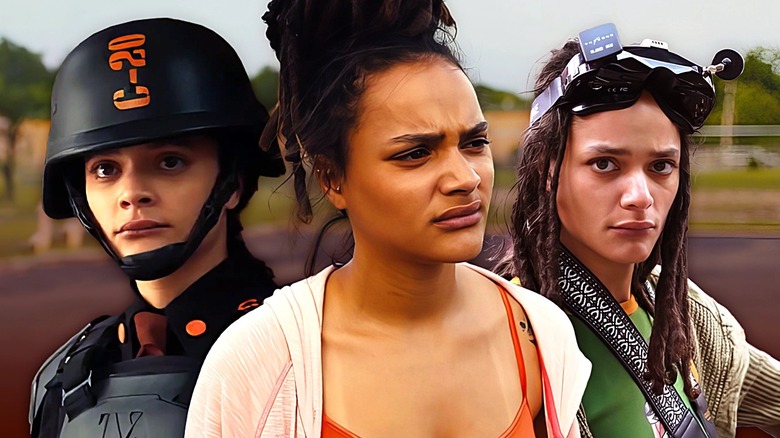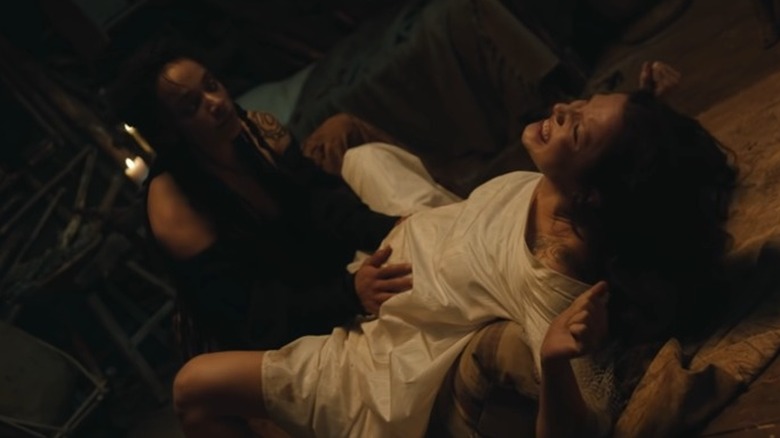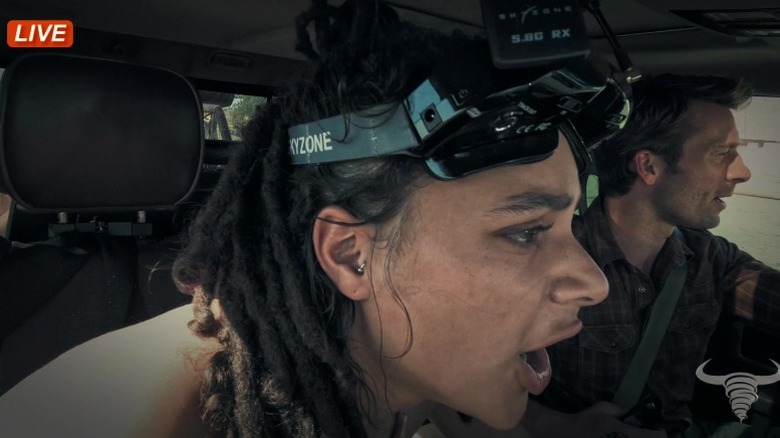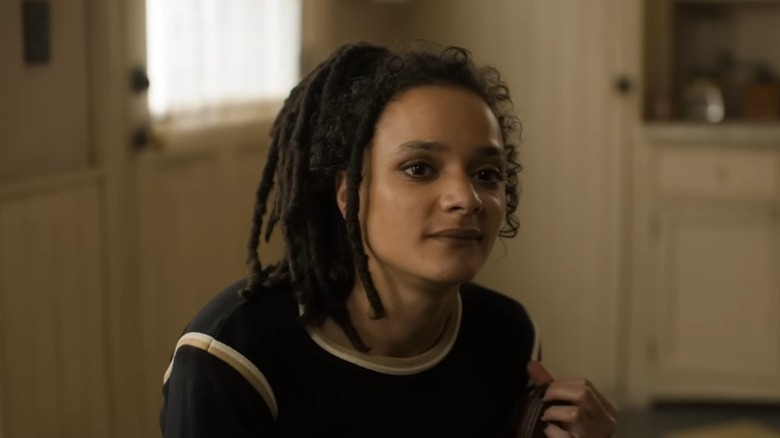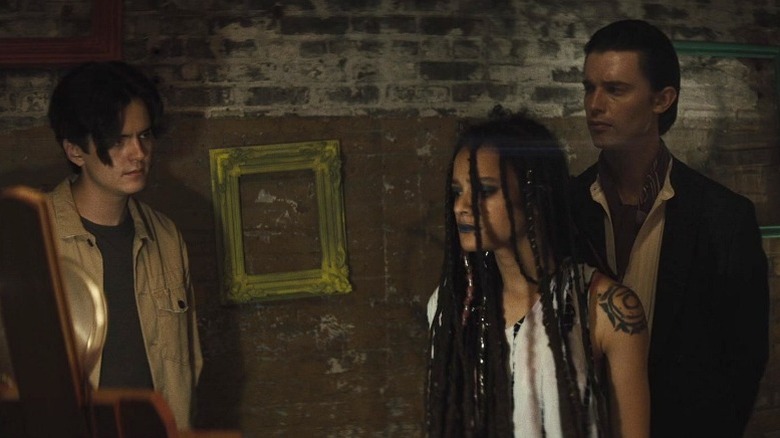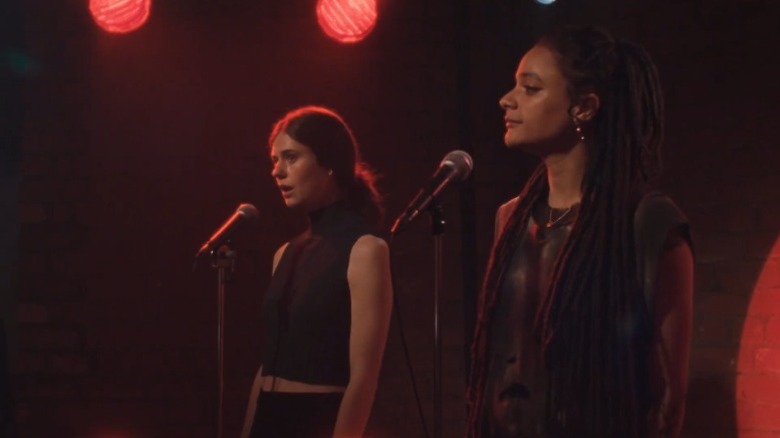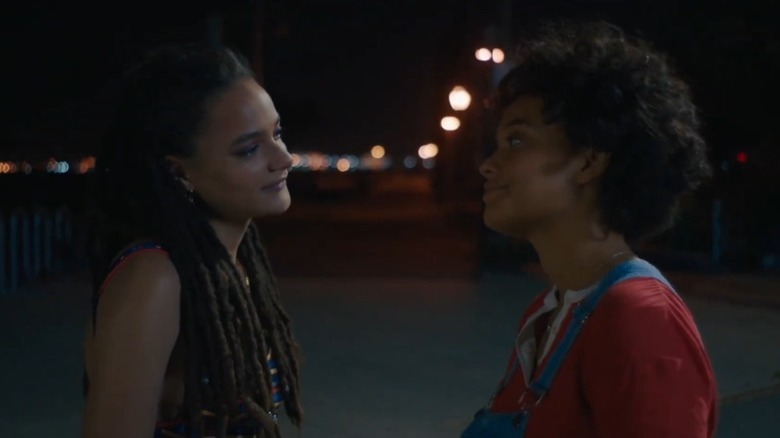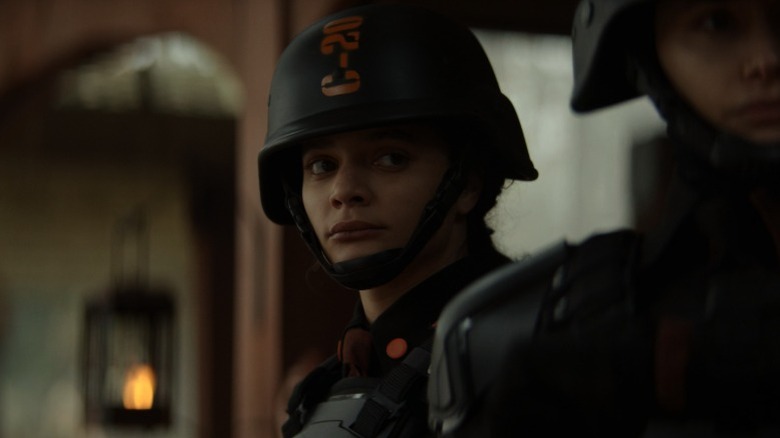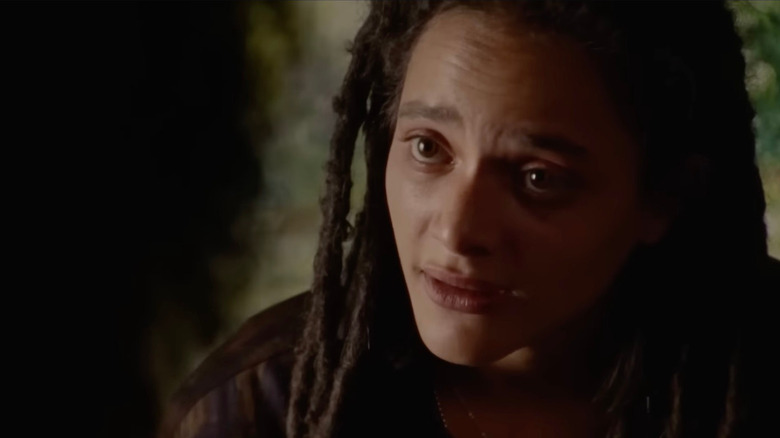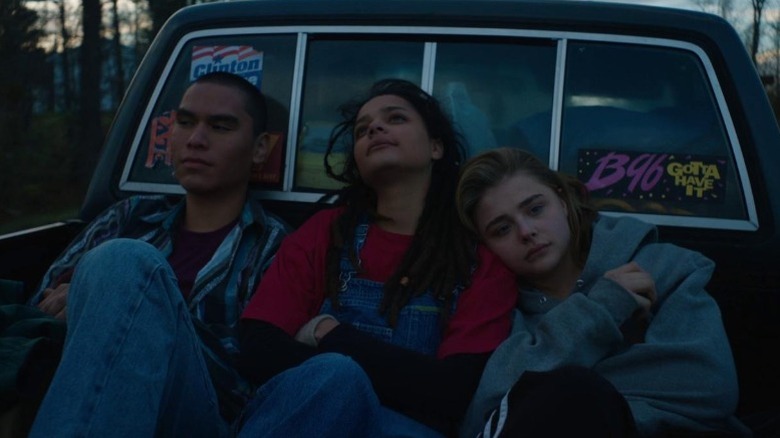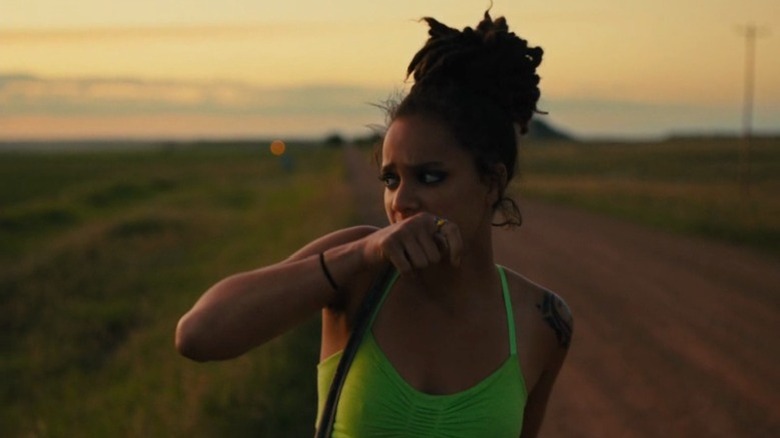10 Best Sasha Lane Movies & TV Shows, Ranked
There may be no other working American actor as underrated as Sasha Lane in her generation. The 29-year-old Houston, TX native has been acting in movies and TV shows for nearly a decade now, and in that time, she's had relatively few starring roles. But her eye for projects has been consistently refined, and even her smaller performances have left an indelible mark on anyone who's been following her filmography.
It all began with the premiere of Lane's screen acting debut, "American Honey," in the main competition of the 2016 Cannes Film Festival, where she managed to steal the spotlight even next to such towering, acclaimed performances as Isabelle Huppert in "Elle," Kim Min-hee in "The Handmaiden," Sônia Braga in "Aquarius," Sandra Hüller in "Toni Erdmann," Kristen Stewart in "Personal Shopper," and Ruth Negga in "Loving." Since then, Lane has accrued just under 20 acting credits, with nearly all of those being in deeply interesting projects, always showcasing her unique skill at commanding attention and building out rich layers of character with even just a few lines and gestures.
We're still waiting on the U.S. film industry to give Lane another proper, front-and-center starring role after "American Honey" — the closest we got was Prime Video's eight-episode American remake of "Utopia," which wasn't very good despite Lane's magnetic performance as Jessica Hyde — but, in the meantime, here's a look at Sasha Lane's best movies and TV shows that are worth checking out while her career blossoms.
If I Can't Have Love, I Want Power
Modern pop music has become fertile ground for visual albums, which are feature or short-length cinematic companions to the body of work constituted by the songs of a particular LP. From Beyoncé's "Lemonade" to Janelle Monáe's "Dirty Computer" to Thom Yorke's "Anima," the genre has amassed a rich, storied tradition in just over a decade. In 2021, Halsey added to that growing tradition with "If I Can't Have Love, I Want Power," a 53-minute period fantasy horror flick that visualizes the songs of her eponymous 2021 alt-rock project.
Written by the singer-songwriter herself and directed by Colin Tilley, "If I Can't Have Love, I Want Power" tells the story of Lila (Halsey), a young and conflicted queen who, while balancing the challenges of love and pregnancy, finds herself in conflict with the malevolent Lilith — an entity who manifests through her mirror reflection.
Sasha Lane appears prominently in the film as the Seer, a witch who lives in a cabin in the woods. After stumbling upon her home in a drunken stupor, Lila turns to the Seer for help with her newfound pregnancy, and the Seer becomes her support system amid the escalating political turmoil bearing down on her. It's a role that allows Lane to have a lot of fun, putting on an impressive display of screen presence and physicality; the movie, meanwhile, is a moody and fascinating journey into the dark, ultra-personal themes of Halsey's best album.
Twisters
A 28-years-later standalone sequel to the '90s box office smash "Twister," "Twisters" takes after its predecessor in filtering an earthy, intense, visually stunning disaster flick through the lens of a small-scale character story. Directed by Lee Isaac Chung (who was originally afraid to take the job), the film again trains its focus on storm chasers in Oklahoma who find themselves caught up in potentially mortal danger: Kate Carter (Daisy Edgar-Jones) is a meteorologist who swore off storm chasing after a tornado killed her boyfriend Jeb (Daryl McCormack) but gets roped back into the field by her friend Javi (Anthohy Ramos). While preparing to test a new tornado scanning system on an impending tornado outbreak, Kate and Jeb come into contact with YouTube storm-chasing celebrity Tyler Owens (Glen Powell), whose loyal crew includes drone operator Lily — played by Sasha Lane in the most mainstream film role of her career so far.
It's not the biggest role ever for Lane, but she impresses plenty of spunk, tenacity, and personality onto the relatively de-emphasized role of Lily, and she shows off her comedic chops in the character's unshakable determination to get the best possible footage. The movie itself, meanwhile, is sturdy Spielbergian blockbuster entertainment with a bonafide dramatic backbone and handsome, atmospheric, well-balanced direction from Chung (also known for the 2020 immigrant family drama "Minari," which earned him Oscar nominations for Best Director and Best Original Screenplay). Certainly it would have benefited from more Sasha Lane, but as actor introductions to multiplex moviegoing audiences go, it was a pretty respectable one.
The Crowded Room
Loosely inspired by the 1981 biography "The Minds of Billy Milligan" by Daniel Keyes, about the first American person to be acquitted of a major crime by pleading dissociative identity disorder, "The Crowded Room" is a 2023 Apple TV+ crime thriller miniseries developed by Akiva Goldsman that uses the terrifying true story of Milligan as the basis for the fictional character of Danny Sullivan (Tom Holland).
Holland, in arguably his meatiest dramatic role yet, plays a man who is arrested due to being involved in a shooting in 1979 New York City and then proceeds to recount his life story to investigator Rya Goodwin (Amanda Seyfried). As he explains the various pieces of his tortuous, tortured past to Rya, Danny emerges as a deeply tragic and contradictory figure, with particular emphasis given to his intense friendship with a young woman named Ariana (Sasha Lane), who was with him at the time of the shooting and seemingly encouraged him to go through with it.
Mixed critical reception notwithstanding, "The Crowded Room" is a gripping, handsomely directed season of television that rewards binge-watching and spaced-out sittings equally. Holland gives the best performance of his career, bar none, and the whole show proves an excellent showcase for actors putting on handsome feats of versatility and dramaturgical agility, with Lane's Ariana, especially, standing as a testament to that. Her charisma burns up the screen from her very first appearance, and from there on out, Lane's performance only expands in scale, complexity, and gravity.
Daniel Isn't Real
A vastly underrated 2019 psychological horror film, Adam Egypt Mortimer's "Daniel Isn't Real" has been making the rounds again lately thanks to its status as a showcase for Patrick Schwarzenegger, who has shined as Saxon Ratliff on season 3 of HBO's "The White Lotus." Indeed, Schwharzenegger's chops as an actor were already on full display in the role of Daniel, the cunning and dangerous childhood imaginary friend of Luke (Miles Robbins), who gets brought back by him as an adult. But, in addition to spotlighting Schwarzenegger and Robbins, "Daniel Isn't Real" also proved to be a great display of Sasha Lane's talents.
Lane plays Cassie, a neighborhood art student to whom Luke takes a liking. Encouraged and aided by Daniel, Luke pursues a relationship with Cassie that inadvertently puts her in danger, and as Daniel begins to hold more and more sway over his creator, Cassie slowly comes to the realization that there's something wrong with her new beau. The film sticks mostly to Luke's frayed point of view and frames Cassie through it, but Lane, ever feisty and commanding as a performer, keeps the character from slipping anywhere within distance of a damsel-in-distress archetype.
The movie, meanwhile, is among the most notable hidden gems of the past decade in indie horror – a wild, weird rollercoaster ride of a movie, incisive and handsomely-directed, featuring a set of young performers who manage to make the escalating nightmare feel achingly, maddeningly real.
Conversations with Friends
Sasha Lane is quickly becoming a miniseries darling. In addition to her central role on "The Crowded Room" in 2023, she was also one of the stars of the British-Irish-American 12-episode co-production "Conversations with Friends" one year prior. Airing on BBC Three in the U.K., Hulu in the U.S., and RTÉ One in Ireland, "Conversations with Friends" is based on the eponymous novel by Sally Rooney, with much of the same creative team that adapted Rooney's own "Normal People" to miniseries format once again in tow — including director Lenny Abrahamson, who helms the first five episodes of the series while Leanne Welham handles the back half.
Like much of Rooney's work, "Conversations with Friends" follows young people dealing with the complexities and the unspoken tensions and agonies of adult relationships. In this case, the young people are Dublin college students Frances Flynn (Alison Oliver) and Bobbi Connolly (Sasha Lane), best friends and former romantic partners. One day, by chance, they strike up a friendship with successful author Melissa Baines (Jemima Kirke), and develop a close bond with both her and her husband Nick Conway (Joe Alwyn). A criss-cross game of infatuations and heartbreak ensues, allowing all four of the main players to shine as their characters' layers get slowly unpeeled. Lane fares especially well in the role of the yearning yet insecure Bobbi, whose budding attraction to Melissa — channelled through masterful chemistry with Kirke — decisively challenges her own understanding of herself.
Hearts Beat Loud
Brett Haley's charming "Hearts Beat Loud" belongs to the storied tradition of personal, small-scale dramedies about making and recording and basking in the joy of music while using it as a conduit to express complicated emotions. It also doubles as an unusually sensitive family drama: Nick Offerman and Kiersey Clemons star as Frank and Sam Fisher, a father-daughter duo from New York City grappling with the imminence of distance and change. Frank, a widower and former musician, owns a flailing record store in Brooklyn, and Sam is about to move cross-country for pre-med school. One day, they record a song written by Sam that becomes a viral hit, prompting Frank to try to convince his daughter to start a musical duo.
In addition to that charged yet deeply affectionate dramatic scenario, "Hearts Beat Loud" also explores the source of much of Sam's musical inspiration through her blossoming relationship with Rose (Sasha Lane). It's still all too rare in American cinema that we get to see full-fledged, tenderly-depicted sapphic love stories between Black women, but here, Sam and Rose's dynamic is given space to breathe. Sam knows that her time with Rose is limited, the continuity of their romance clashes with her life ambitions, and the speed at which her life is changing makes it dizzyingly difficult to split the difference, but it's only because of all the love the two women feel for each other, perfectly rendered in Clemons and Lane's natural, locked-in, intimate performances.
Loki
The post-"Avengers: Endgame" era of the Marvel Cinematic Universe has, to some, yielded diminishing returns, with many of the franchise's plentiful — some might say oversaturated — film and TV offerings since 2020 failing to leave as much of a cultural impact as most of the pre-2019 stuff. But one thing almost everybody can agree on is that Disney+'s "Loki" is among the unqualified highlights of the Multiverse Saga. A spin-off of "Endgame," "Loki" follows the alternate-universe version of Loki (Tom Hiddleston) who gets his hands on the Tesseract and escapes detainment in the 2019 film. Shortly after those events, Loki is arrested by agents of the Time Variance Authority (TVA), and forced to work with them to stop an even bigger threat to the multiverse.
With that setup as its starting point, this Michael Waldron-created, wryly hilarious time-hopping crime procedural manages to spin more fun, pathos, comedy, visual exuberance, and genuine depth from the multiverse conceit than anything else in the MCU so far — like a constantly spinning sci-fi Rubik's cube that mirrors the irreverence of the God of Mischief himself.
Sasha Lane appears in the second, third, and fourth episodes of season 1 as Hunter C-20, a TVA agent who gets kidnapped by the female Loki variant Sylvie (Sophia Di Martino) and placed under enchantment in order to reveal the location of the Time-Keepers. It's a small, tragic role that sets the stakes for the whole show, and Lane makes the most of it, painfully communicating the devastating extent of the trauma and confusion left on C-20 by Sylvie.
How to Blow Up a Pipeline
Adapted by director Daniel Goldhaber along with Ariela Barer and Jordan Sjol from the eponymous book by Andreas Malm, "How to Blow Up a Pipeline" uses Malm's nonfiction treatise on climate justice as the basis for a fictional story about eight West Texas activists who decide to, well, blow up a pipeline.
Vastly different in tactical and moral outlook yet brought together by the common goal of fighting the climate crisis, the eight protagonists of "How to Blow Up a Pipeline" make up a rich and compelling panorama of contemporary climate activism in all its urgency and complexity. Sasha Lane plays Theo, a young woman with terminal cancer caused by the oil refinery pollution in her city, who is determined to use the time she has left to fight back against the corporate and industrial powers laying waste to her world. To this end, she enlists the help of her girlfriend Alisha (Jayme Lawson), who is skeptical about radical action but ultimately joins in on the effort to disrupt a local oil pipeline with homemade explosives.
As you can probably tell just by that description, it's an emotionally and politically fraught film — one that Goldhaber carries out brilliantly, masterfully building suspense and maintaining narrative propulsion while honoring the story's human scale and character stakes. For all the story's collectivist bent, each principal player gets to shine bright in their own way, with Lane's dogged, mournful, nothing-left-to-lose determination proving a particular highlight.
The Miseducation of Cameron Post
Not nearly enough people saw Desiree Akhavan's "The Miseducation of Cameron Post" back in 2018, certainly not in proportion to the film's quality, depth, and urgency. A quiet queer triumph nonetheless, it remains one of the best, most piercing, most scorchingly personal and lived-in films made about the realities of homophobia and LGBTQ+ self-loathing in the 21st century, as well as about the avenues out of that suffering offered by queer community.
Based on the eponymous novel by Emily M. Danforth, the film is set in 1993 and tells the story of Cameron Post (Chloë Grace Moretz, in maybe her best performance), a lesbian teenager who gets discovered by her fundamentalist Christian aunt and sent to a conversion therapy camp. At the camp, named God's Promise, Cameron meets a wide array of queer teens struggling with their identities under the harshest possible conditions. The bond she forms with two of them, Jane Fonda (Sasha Lane) and Adam Red Eagle (Forrest Goodluck), offers some respite amid the regime of constant repression and psychic violence overseen by Dr. Lydia Marsh (Jennifer Ehle) and Reverend Rick (John Gallagher Jr.).
It's a sensitive, hard-hitting, great film, and, in the role of Jane, a hippie-raised inveterate rebel just biding her time until she gets the opportunity to leave God's Promise, Saha Lane arguably anchors it all, with her confident, unrepentant attitude serving as a lifeboat for Cameron as the world pressures her to give up every important part of who she is.
American Honey
Andrea Arnold's "American Honey" is an emphatic, deeply moving masterpiece, and one of the best movies of the 21st century. It's also the movie that introduced the world to Sasha Lane, who was just enjoying her spring break on a beach when Arnold (famously fond of street casting) came across her and invited her to audition. Confident enough in Lane's talent to build her whole 163-minute movie around her, Arnold thus set the stage for one of the most extraordinary breakthrough performances of the 2010s, and the rest is history.
Like a lot of Arnold's films, "American Honey" takes an intimate, freewheeling, fly-on-the-wall approach to the lives of working-class youth, with the additional factor of being the English filmmaker's first, and so far only, film to take place in the United States. Lane stars as Star, a teenage girl from Muskogee, OK, who finds a chance to escape her dreary and anguished life by joining a traveling magazine sales crew. She begins to cart through the United States aboard a van in the company of a ragtag crew of young workers, finding joy and misery, liberation and danger alike in the vicissitudes of her new, rudderless life.
A master of her craft, Arnold finds so much poetry, poignancy, complexity, and trenchant social insight in Star's journey that the movie gets to feel overwhelming in the best way. And Lane, as camera-natural as she is stringently attuned to the nuances of Star's emotional and existential turmoil, holds court over it all like a born ... well ... superstar.
